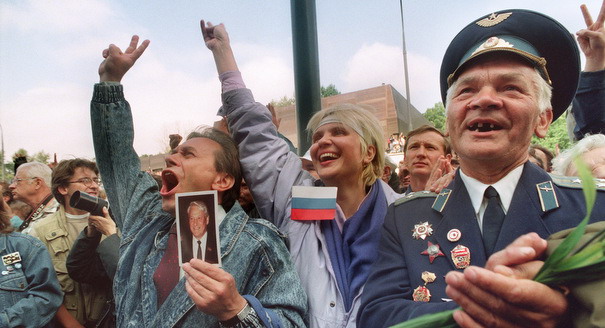On August 19, 1991, I was in Moscow. I will never forget those days of Sturm und Drang, which were in a way very romantic.
“—The rain ended by evening and the setting sun shone brightly on the wet, red bricks of the city’s buildings. At a nearby intersection a young girl on roller skates, dressed in a tee shirt and yellow shorts, gaily handed out passersby flyers about the failed coup. Even the sad tune that a beggar sitting on the curb was playing on the accordion sounded merry somehow. The faces of pedestrians shone with joy. They were proud that their support had helped pave the way for a new era. They were enjoying a honeymoon with Freedom and Reform.
There’s a great emptiness in my heart, Ilya thought, but at the same time a sense of something fresh and unfamiliar. A new era…”
(from my own novel “Land of Legend... Land of Dream”)
The euphoria was over a few days later, and since then the liberty in Russia has been on the wane. But it had been predictable. When Gorbachev started reforms, I was eager to tell him, “Mr. Gorbachev, do you really mean to dismantle the Soviet economic system? You would ruin the entire economy.” And so he did, followed by Yeltsin. It was Putin who gathered bits and pieces of the defunct behemoth and brought back a semblance of stability (even prosperity for some), like the one in Brezhnev era.
Today, there is no misery like in Yeltsin’s days, but the emptiness remains in economy as well as in the hearts of the people. The economy is too dependent on oil and gas, and the society tends to suffocate the creative intellectuals and innovative business people. As the economy is largely nationalized, business schools remain irrelevant; their graduates cannot find proper jobs in which they are able to use their knowledge and skill. Indeed, it is time to rename the business schools to schools for future state officials.
How to get out of this stalemate? Firstly, far more foreign direct investment should be allowed into Russia (especially in manufacturing sectors); secondly, the cutting edge high-tech sectors (e.g. aviation, information and communication, nuclear technology, and space technology) should be accompanied by lean and dynamic management; and thirdly, a better environment should be provided for small and medium enterprises. The Internet now serves not only for political meetings and demonstrations, but also for venture business; the start-up costs have been dramatically reduced.
These are well-known remedies, but they are not implemented because of the well-known obstacles, political, economic, and social. But if they are not realized, then what will happen? One of the historical precedents was the French July Revolution of 1830, in which new bankers and industrialists prevailed over royalists to realize further growth. Another case was the Russian October Revolution of 1917, in which a small number of revolutionaries took power backed by frustrated masses; later they “nationalized” all enterprises, a sure way for stability—and stagnation.
History evolves in circles. Some countries are destined to repeat unproductive cycles of stability and violent redistribution of wealth, and others, thanks to innovation, somehow manage to reach a higher stage after each cycle. China may soon reveal that she belongs to the first type, whereas the United States, Germany, Japan, and a few others will get out of the Lehman financial crisis with an even more robust economy. To which type Russia will belong depends upon the work of the government and the will of the society. I hope that the liberty in Russia and my novel “Land of Legend... Land of Dream” will have an eventual victory.
